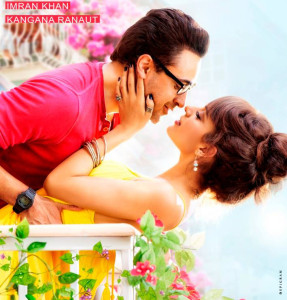 For his new film Katti Batti, director Nikhil Advani has brought together the fabulous pairing of Kangana Ranaut and Imran Khan, and fans cannot wait to see the two actors together in the modern day romance. In the film, Imran Khan plays young architect Madhav Kabra, who is totally in love with the free-spirited Payal (Kangana Ranaut). They make a perfect couple until a sudden turn of events tests the fate of their relationship. Do they get their happily-ever-after filmi style? Well, we will find out on September 18th!
For his new film Katti Batti, director Nikhil Advani has brought together the fabulous pairing of Kangana Ranaut and Imran Khan, and fans cannot wait to see the two actors together in the modern day romance. In the film, Imran Khan plays young architect Madhav Kabra, who is totally in love with the free-spirited Payal (Kangana Ranaut). They make a perfect couple until a sudden turn of events tests the fate of their relationship. Do they get their happily-ever-after filmi style? Well, we will find out on September 18th!
One of my absolute favorite stars to interview is Imran Khan because our interviews always turn into really cool conversations, and that happened again when we sat down to discuss Katti Batti. Check out what we chatted about in this in-depth exclusive interview!
I believe, as we have talked before, you choose films that you want to see, so what was it about Katti Batti that made you say ‘yes I want to see this film’?
I started to feel, in the past couple of years, that the films that I was watching, the films that I was doing there was a kind of a lack of emotional depth. It always felt like there wasn’t much at stake. Your classic romantic films where boy meets girl, they kind of like each other, they fight a little a bit, they have a misunderstanding, but then everything works out in the end. Now what really drew me to Katti Batti is that it is actually a film that starts where most love stories end. I have actually been referring to it as a spiritual sequel to Jaane Tu Ya Jaane Na, because this is a film, where this couple, Maddy and Payal, they meet in college, they kind of like each other, they start to date, they fall in love, they move in together and while they are living together they start to fight and you see the hardships of the relationship because the honeymoon period has ended. They break up and then the movie begins. The movie actually starts at the end of a seven-year relationship, where the honeymoon period is long gone. You’ve seen the ugliness – you’ve seen the downturn. Then it is a question of whether, for this couple, is their love strong enough to survive this. It did feel like a more adult, a more grown relationship, you know? I was able to really plug into it emotionally because as I was looking at it I could see shades of my relationship with Avantika.
You know Avantika and I, we have been together 13 years now. And obviously after the first few years, the initial romantic days – those rose colored glasses come off. The honeymoon period is over. Then it becomes about actual hard work. Suddenly you find yourself in a relationship and this is a person that can infuriate you more than anyone else, who can get on your last nerve, who you can fight with tooth and nail and you love them in spite of that! That is real love. You don’t love someone because – you love someone despite.
This is a story that seems to be something new for Hindi audiences, more of a grown up romance as you have said…
You know, what it really comes down to is that the center of the piece, the heart of the film and the message of the film is that love conquers all. Love is greater than all of us. Love is what drives us to greater heights, it moves us, it inspires us. That is something that is a classic filmi, a classic cinematic, and a classic romantic trope, that doesn’t go away. For me, that is also what I love about it. It is kind of a grand romance.
For those who don’t know, explain Katti Batti both in term and the film.
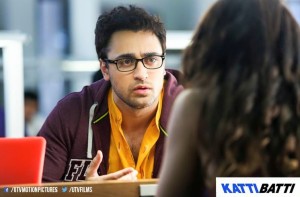 This is actually something we have been struggling with ever since we have locked in on the title. This is something that kids in India do, when you fight with someone, when you are not talking to them you show them your little finger and you say that now we are katti, which means we are not friends. When you make up, once you are friends again, you hold your index and middle fingers together and you point them out and you say now we are batti. This is something that all of us used to do as kids. You fight with someone, you are angry, katti, friendship over – once you have made up, batti, you are friends again. When we originally came up with the title we did have the questions of will people get this, will people remember, is it something that translates across. We tried to sort of explain this by making those three short films, which are actually not scenes in the film, they are stand alone promotional tools underlying the concept of katti and batti. Those are the ones Sunday Brunch, On A Long Drive, Bedtime Stories, all three of those are shot with the idea of introducing people with the concept of katti and batti.
This is actually something we have been struggling with ever since we have locked in on the title. This is something that kids in India do, when you fight with someone, when you are not talking to them you show them your little finger and you say that now we are katti, which means we are not friends. When you make up, once you are friends again, you hold your index and middle fingers together and you point them out and you say now we are batti. This is something that all of us used to do as kids. You fight with someone, you are angry, katti, friendship over – once you have made up, batti, you are friends again. When we originally came up with the title we did have the questions of will people get this, will people remember, is it something that translates across. We tried to sort of explain this by making those three short films, which are actually not scenes in the film, they are stand alone promotional tools underlying the concept of katti and batti. Those are the ones Sunday Brunch, On A Long Drive, Bedtime Stories, all three of those are shot with the idea of introducing people with the concept of katti and batti.
I love that you are starring opposite Kangana, what do you think made the equation between the two of you work so well?
 You know actually Kangana and I have a very, very different approach to the way that we prep, the way that we play scenes. Kangana is one of those people who will arrive on set in the morning in the headspace that she needs to be in and she doesn’t step out of there. Whatever the zone of the scene is, she maintains that. I am on – off – on – off. I love to mess around in between takes. I am chatting with everyone: I am chatting with the cameraman, I am telling the sound recordist a joke. So actually our approach is very, very different. I think that actually added something interesting because Maddy is a guy who is madly in love with Payal, and despite everything that has gone before he refuses to give up. He is like, ‘No, I love her and I know she loves me and I am going to make this work’. From her end, he is getting nothing back. What is he is getting from her is ‘No, not interested. It is done. Go away.’ I think it actually did play into the characters and their dynamic.
You know actually Kangana and I have a very, very different approach to the way that we prep, the way that we play scenes. Kangana is one of those people who will arrive on set in the morning in the headspace that she needs to be in and she doesn’t step out of there. Whatever the zone of the scene is, she maintains that. I am on – off – on – off. I love to mess around in between takes. I am chatting with everyone: I am chatting with the cameraman, I am telling the sound recordist a joke. So actually our approach is very, very different. I think that actually added something interesting because Maddy is a guy who is madly in love with Payal, and despite everything that has gone before he refuses to give up. He is like, ‘No, I love her and I know she loves me and I am going to make this work’. From her end, he is getting nothing back. What is he is getting from her is ‘No, not interested. It is done. Go away.’ I think it actually did play into the characters and their dynamic.
Tell us about working with Nikhil Advani.
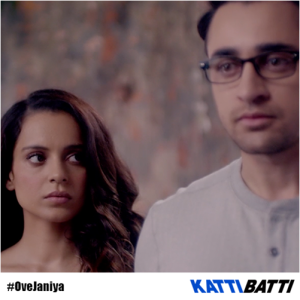 I have to say that Nikhil is the most collaborative director that I have ever worked with. The man has absolutely no fear. I have worked with so many directors who clam up or who get really uncomfortable, or even get offended if you give them an opinion, if you give them any kind of a critique. Filmmakers who will not show you the film, saying it is not ready yet, later, later, later, because they cannot handle the idea of you saying I don’t think it works. Nikhil, on the other hand, is the first one that has the editing room open and inviting people in saying watch the film and tell me what you think. Did you get bored? Did you not understand something? Is this not making sense to you? Is this feeling too convenient, too easy? What do you feel? He is the first one to invite opinions from everyone. He is the first one to look for solutions rather than giving you an answer like ‘Oh don’t worry by the time the movie is done it will sorted’. No, this is a guy who looks for solutions.
I have to say that Nikhil is the most collaborative director that I have ever worked with. The man has absolutely no fear. I have worked with so many directors who clam up or who get really uncomfortable, or even get offended if you give them an opinion, if you give them any kind of a critique. Filmmakers who will not show you the film, saying it is not ready yet, later, later, later, because they cannot handle the idea of you saying I don’t think it works. Nikhil, on the other hand, is the first one that has the editing room open and inviting people in saying watch the film and tell me what you think. Did you get bored? Did you not understand something? Is this not making sense to you? Is this feeling too convenient, too easy? What do you feel? He is the first one to invite opinions from everyone. He is the first one to look for solutions rather than giving you an answer like ‘Oh don’t worry by the time the movie is done it will sorted’. No, this is a guy who looks for solutions.
This absolutely made the working experience and the film better. And this was the kind of working experience that now I don’t know if I can go back to working with people who are not like this. Because the way Nikhil and I worked it was how I felt when I was making Jaane Tu, how I felt when I was making Delhi Belly. It made me feel that way.
Of course as always we have to talk music, so which is your favorite song?
Well, I am sure if you have heard the album, you know which one, Stacey…
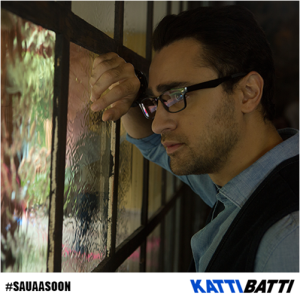 I knew you would say that (laughs)! I would say, and this is for me too, ‘Sau Aasoon’ or ‘Ove Janiya’.
I knew you would say that (laughs)! I would say, and this is for me too, ‘Sau Aasoon’ or ‘Ove Janiya’.
Yes, you are right! For me, it is a toss up between ‘Sau Aasoon’ and ‘Ove Janiya’ depending on the day. They are so beautiful and they are such beautiful lyrics to both the songs. They are both tearjerkers. If you have seen the video for ‘Sau Aasoon’, that is not the video that will be in the film. They felt they wanted a lip sync version for the promotions but in the film, it is a narrative song.
I have always wondered how hard is it to lip sync and how you prepare to do that.
This is actually very interesting. Aamir had actually given me really good advice for this during the making of Jaane Tu. He said, firstly, obviously you need to sing for real. You don’t have to know how to sing, but when you are actually singing you are going to be breathing, your vocal chords are going to be straining – so it looks like you are actually singing and it helps it match up. The other thing that Aamir told me, which is really interesting, is that you have got to put headphones on and really listen to the song and you also have to really listen for when the singer takes a breath and you have to take a breath at the same time so you are matching it exactly. It is really tricky.
What do you think is the coolest thing about this film?
Because it is actually one of those films where you do feel like there is something very, very great at stake. The stakes are high. The emotions are high. The second half of the film is a massive tear-jerker. I promise if you are not crying by the end of this film then I would consider we have failed.
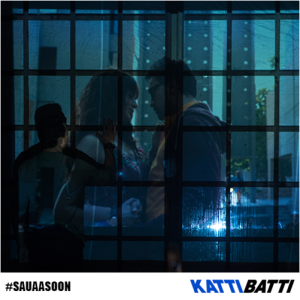 What do you think of Hindi films today?
What do you think of Hindi films today?
It is even better than it has ever been. In the last 5-7 years there has been so much interesting work happening. I am talking about that there are so many interesting new talents coming in, young producers, young writers and directors. People who are actively wanting to try something new. You look at the kind of films that are being made Dil Dhadakne Do, something like Queen – 10 years ago there is no way that films like these would get made.
What motivates you to be an actor?
I watch movies because I want to react emotionally; I want to have an organic visceral reaction. That is what I am looking for as an audience. When I watch an emotional film I want to weep, I actually want it to make me cry. I want it to make me laugh out loud. I go to the cinema to be swept up in movies. When I make movies that is what I want my audience to experience as well. I want them not to be looking at it with any kind of critical analysis, or intellectually. No, none of that. You have to be swept up in the emotions of the story. If we are not doing that we are failing, we are not doing our job right.
What to you makes a good actor?
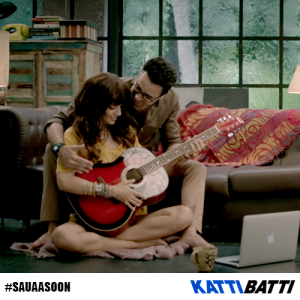 For me, it comes down to being able to portray something with honesty. You may not always personally connect with a scene. You may not even personally agree with what you are doing… you are playing a drug addict, rapist, neo-Nazi but you are an actor and you may not share any of these opinions but you have to sell it. It really does come down to finding some thread in there that you can latch onto and that you can sell convincingly and honestly. How you do that – now every single actor is going to have their own process, because the act of tapping into emotions and tapping into your emotions is going to be different for every single person. There is no way I could tell you do this, this and this and done. I have to find my own way, Kangana had to find her own way, every single actor on earth has to find their own way to say something with conviction and portraying it honestly. For some that involves immersing yourself in it: learning a new language, changing the way they look, the way that you hold your body, for some it may be just as simple as flipping a switch.
For me, it comes down to being able to portray something with honesty. You may not always personally connect with a scene. You may not even personally agree with what you are doing… you are playing a drug addict, rapist, neo-Nazi but you are an actor and you may not share any of these opinions but you have to sell it. It really does come down to finding some thread in there that you can latch onto and that you can sell convincingly and honestly. How you do that – now every single actor is going to have their own process, because the act of tapping into emotions and tapping into your emotions is going to be different for every single person. There is no way I could tell you do this, this and this and done. I have to find my own way, Kangana had to find her own way, every single actor on earth has to find their own way to say something with conviction and portraying it honestly. For some that involves immersing yourself in it: learning a new language, changing the way they look, the way that you hold your body, for some it may be just as simple as flipping a switch.
What type of film, if you were going to direct a film, would you do?
While I love action thriller films, it is a genre that I love watching. I very much like it to be tempered with very, very deep emotion as well. A very, very solid human story because really that is what pumps the stakes up. The emotional investment for me is always the strongest thing.
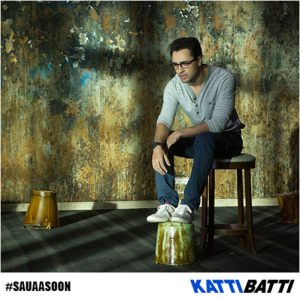 Do you have any other projects lined up?
Do you have any other projects lined up?
Actually no. I really want to take my time and see how people react to Katti Batti. I have a great deal of faith in the film! If I am honest I don’t get to say that about every film. I can’t look at every film I have done and say I have faith in it. I am very proud of it. I know time and again, I have made films where all of us have made wrong choices and made mistakes. There are three or four films of mine that I can look at it and say this I am proud of, this I would show to anyone. Janne Tu was one of those, Delhi Belly was one of those, and for me Katti Batti is one of those.










